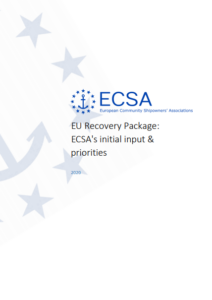EU leaders agreed on a €750 billion recovery fund to help the EU tackle the crisis caused by the COVID-19 pandemic, while ECSA published its priorities for a recovery plan.
Since the beginning of the pandemic, the industry faced several challenges such as massive negative demand shocks, supply chain disruptions, a steep decrease in foreign and domestic trade, and overall reduced mobility.
Martin Dorsman, ECSA’s Secretary General commented that
ECSA’s proposal for a recovery package consists of short-term measures aimed at the continuity of hard hit segments of the EU shipping industry and medium- and long-term measures supporting the decarbonisation and greening of the EU shipping industry.
Thus, ECSA expressed some of its expectations, concerns and opportunities in the newly-published document.
Its input and priorities document also expresses the industry’s deep concerns about the contradictions of the extension of the Emissions Trading System to the maritime sector as an identified possibility of future EU own resources.
Concrete support measures:
- The EU to develop guidance for EU Member States and banks, recognising its competence and respecting applicable national public and private legal frameworks and conditions, on solvency and liquidity related measures (could be linked to Pillar 2) to overcome short term issues.
- Member states should be encouraged to seriously step up with investments in future proof port infrastructure and more specifically bunker infrastructure, such as for On shore Power Supply OPS.
- The EU’s TEN-T policy, and more particularly the Motorways of the Sea concept and the positive modal shift it can bring, should be updated, made more flexible and maximised to ensure the realisation of a resilient and sustainable EU transportation network, with the shipping sector being an important element in that.
- A strong R&D policy (in particular Horizon Europe) which covers the needs of the sector and the important partnerships with other stakeholders in the EU maritime cluster, e.g. copartnership zero-emission waterborne transport can significantly contribute to the long term recovery.
- EU and national public tenders that reward innovation can give European shipowners an improved competitive position (e.g. in segments such as dredging and offshore wind.
- Stepping up the energy transition by for instance supporting offshore wind developments.
- Accelerating the support for development and uptake of digitalisation in shipping, port and logistics ecosystems.
- Ensuring, during the implementation process, access of SMEs and mid-cap size companies to the needed instruments.
Mr Dorsman concluded that
European shipping has to be competitive at both global and EU levels. Any new policy actions should support the industry in its decarbonisation commitments and efforts and not unnecessarily and disproportionately put burdens and costs on businesses.
Learn more by clicking herebelow































































